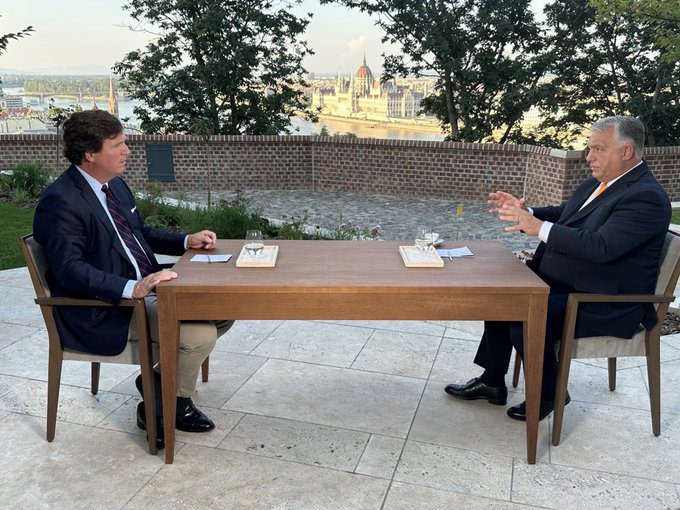
Photo: @TuckerCarlson on X (Twitter), August 22, 2023.
“When Donald Trump was President, he didn’t try to control the fate of Central Europe, he didn’t treat his partners condescendingly, but believed in negotiating on an equal footing in an effort to strike mutually beneficial deals,” Ágoston Sámuel Mráz, head of the Nézőpont Intézet think-tank in Hungary told The European Conservative, reacting to Tucker Carlson’s interview with Hungarian Prime Minister Viktor Orbán.
Ep. 20 Hungary shares a border with Ukraine. We traveled to Budapest to speak with the country’s prime minister, Viktor Orbán. pic.twitter.com/LOzpMrQNIz
— Tucker Carlson (@TuckerCarlson) August 29, 2023
In the interview, Orbán talked about his conservative government’s rocky relationship with the Biden administration, the U.S. government’s ‘big money’ spending to finance Hungarian opposition, and the United States’ decision to terminate the double taxation avoidance agreement with Hungary—just some of the hostile moves by U.S. Democrats against Hungary. Orbán stressed, however, that “this is not the voice of America, it’s the voice of the administration of the United States. Not all Americans have the same approach as the government.” Talking about Donald Trump, with whom he had a good working relationship, he called the previous president a “friend of Hungary,” who will “hopefully come back.”

As Ágoston Sámuel Mráz explained:
The biggest difference between Joe Biden and Donald Trump is that the former is a professional politician who keeps referring to moral principles and is implementing a strategy which harms Central Europe, while the latter is a businessman with whom it is possible to make deals.
In another sign of where the Biden administration’s interests lie, Democrat member of the U.S. House of Representatives James Crow arrived in Budapest on Wednesday, August 30th—the same day the interview with Viktor Orbán was made public on Tucker Carlson’s X page—“to discuss U.S. support for Ukraine, promoting democracy at home and abroad, and bringing the U.S. and Hungary closer together.” He and U.S. Ambassador David Pressman met Klára Dobrev, the leader of Hungary’s largest opposition party, left-liberal Demokratikus Koalíció.
During his visit to Budapest, @RepJasonCrow met with MEP @DobrevKlara and other political representatives to discuss the wide range of views across the Hungarian political spectrum. pic.twitter.com/JFxPGBNDio
— U.S. Embassy Budapest (@usembbudapest) August 31, 2023
Klára Dobrev has stated that her party aims to strengthen the bilateral relationship, not destroy it. However, conservatives in Hungary point to David Pressman, Joe Biden’s pick for the post of U.S. ambassador to Budapest, as a source of antagonism. Pressman has put a strain on the relationship by questioning Hungary’s alleged lack of support for Ukraine and criticising the Hungarian government over internal policies promoting social conservatism. An op-ed last year in The Wall Street Journal called the ambassador’s actions “grade-school antics, not the projection of American power.” The article strongly criticised the Biden administration’s foreign policy decisions:
The exportation of American culture has long been one of our nation’s greatest soft-power assets. But instead of using it to affirm Western values and U.S. interests, the Biden administration is proselytising for woke ideology. The foreign policy implications could be catastrophic.
Hungary has been widely criticised by Western powers for its stand on the war in Ukraine. The Central European country has been the only NATO and EU member since the start of Russia’s invasion that has been calling for peace negotiations, and while it has resisted pressure to militarily assist neighbouring Ukraine, Hungary has aided humanitarian efforts and welcomed hundreds of thousands of Ukrainian refugees.
Explaining Hungary’s position, Viktor Orbán told Tucker Carlson, that despite Western assistance to Ukraine, Ukraine cannot win the war. “They will run out of soldiers earlier than the Russians. What finally will count is boots on the ground,” he said. “To sit in Washington—safe United States—is a different feeling than to sit here in Budapest. Ukraine is a country next door. So what’s going on there could have an immediate impact in 24 hours here in Hungary,” Orbán added.
Ágoston Sámuel Mráz explained that Hungary witnessed the wars in Yugoslavia in the 1990s and that the damage is still deeply engraved in Hungarian memory. Not wanting to perpetuate more war, the current Hungarian government is therefore focusing on humanitarian activities. The second reason for Hungary’s stance is the economy. According to Mráz,
The war is destroying the European economy. The German economy is in recession, their industry has lost its cheap Russian energy sources, so now they can’t achieve their desire for a green revolution. And if Germany is ill, then Europe is ill too. All this has an effect on our societies, because without cheap and stable energy prices, we can’t curb inflation either.
Ending the war in Ukraine is a top priority for Orbán. In the interview with Carlson, Orbán praised Trump, saying the former president—who is currently running to be the Republican party’s nominee at next year’s presidential election—would strive to end the war, unlike Biden. “The best foreign policy of the recent several decades belonged to him. He did not initiate any new war,” the Prime Minister said. He also emphasised that offering NATO membership to Ukraine would be dangerous, a possible catalyst for global war, proposing instead to “make a deal with the Russians on the new security architecture to provide security, sovereignty for Ukraine.”
Ukrainian reactions to the interview were unsurprisingly critical. Orbán’s words sparked indignation, especially his assessment of Ukraine’s desire to seize back Crimea—also an ambition of U.S. policymakers—as “totally unrealistic.” “We do not know about Hungary, but Ukraine does not trade its territories or its sovereignty,” said Ukrainian Foreign Ministry spokesman Oleg Nikolenko, claiming that Orbán has legitimised Russia’s aggression. Russia annexed the ethnically Russian-majority Ukrainian peninsula, Crimea, in 2014, and Ukrainian President Volodymyr Zelensky has pledged to retake it.
